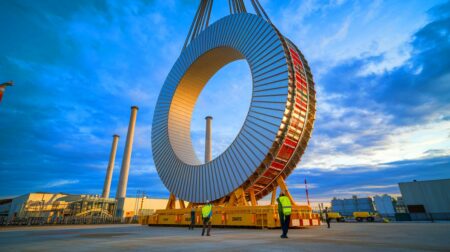Shunning nuclear energy could cause the United Kingdom to miss its targeted cuts in its carbon emissions, according to a new report by the British research body the Energy Technologies Institute (ETI).
The UK has pledged to achieve zero-net carbon emissions by 2050, yet the ETI’s findings cast doubt on that ambition’s feasibility without increased reliance on nuclear power. The ETI’s analysts argue that nuclear plants can play an important role in the country’s low-carbon energy transition.
Large-scale nuclear reactors are best at providing baseload electricity, small modular reactors (SMRs) and advanced modular reactors (AMRs) could be deployed in flexible ways to provide heat and electricity power in cost-effective ways. Innovations in nuclear technology is expected to enable AMRs to begin to be deployed from 2035 onwards, ETI says.
During the process of decarbonization of the country’s energy system “there may be potential future roles for advanced low-cost nuclear technologies,” argues Jonathan Wills, the organization’s CEO. “The potential system benefits of deploying such technologies alongside renewables and carbon capture, storage and use are yet to be properly explored.”
The deployment of more nuclear power across the United Kingdom could also be a boon to consumers, Wills says. “The sensitivity analysis reported in this insight document hints that the potential prize associated with nuclear, even with very pessimistic assumptions, can be significant not only in the value to consumers but also in economic opportunity,” he notes.
Transitioning to low-carbon energy at a rapid pace in countries such as the United Kingdom would help mitigate the environmental effects of global climate change. If deployed in tandem with renewables, nuclear energy could help British people maintain their modern lifestyles at far lower environmental costs, experts believe. Unlike renewables nuclear energy isn’t dependent on weather conditions, which makes it ideal as a safe and reliable provider of constant stable-grid electricity on an industrial scale.
“Per unit of energy produced, nuclear is the safest of all energy sources. Nuclear plants do not release any air or water pollutants as part of their normal operation,” David Watson, a British physicist and clean energy advocate, told Sustainability Times. “They operate 24/7, unlike intermittent solar and wind which must be backed up by methane gas-burning plants since grid-scale storage is still years away.”
However, given the costs and complexities involved in the development and deployment of nuclear technologies, governments should play a greater role, argues Nick Thompson, who has a Ph.D. in nuclear engineering and works for the Los Alamos National Laboratory in the United States as well as for the Institut de radioprotection et de sûreté nucléaire in France.
“Government labs have a good track record of designing and building reactors,” Thompson told Sustainability Times. That is why governments should “have a much larger role in the construction of commercial reactors, where certain rules and regulations could be waived to speed up construction,” he added. “In several countries the government already plays a much larger role in the deployment of new reactors and this can result in lower costs and faster deployment.”
To make the process of acquiring new nuclear faster and more efficient, the UK’s government, Thompson says, “could make a commitment to buy a large number of reactors, which would help to build the supply chains and workforces needed to reduce costs.”
Did you like it? 4.6/5 (27)








